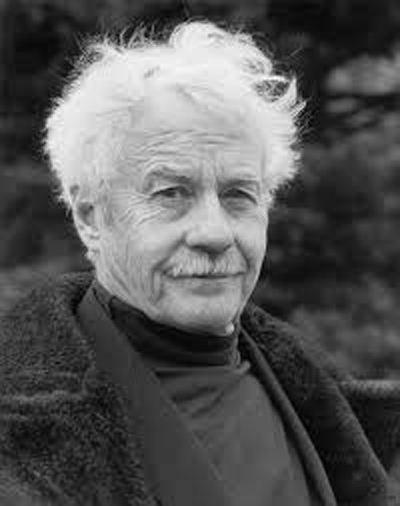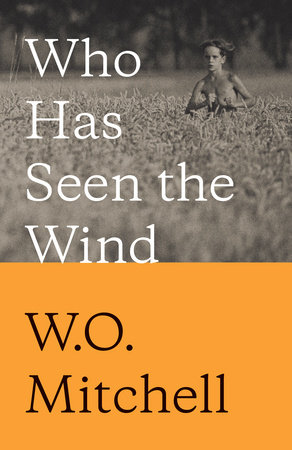W.O. Mitchell
Writer
W.O. Mitchell
Writer
Born: Weyburn, SK
W.O. Mitchell
Canadian Writer
W.O., the only Canadian writer known by his initials alone, was one of Canada’s best-loved storytellers. Who Has Seen the Wind has become the classic Canadian prairie novel selling close to a million copies since its publication in 1947, and Jake and the Kid became one of the most popular series in CBC radio history in the 1950s. W.O.’s live reading performances for audiences across Canada were legendary. His shock of white hair, brown snuff-dusted moustache, gravely voice and ad-libs were the trademarks of his story-telling, and he became known as Canada’s Mark Twain.
NOTABLE WORKS
Hailed as a great Canadian classic on boyhood, Who Has Seen the Wind evokes the sheer immensity of the prairie landscape, from the relentless wind to the far reaches of the bright blue sky.
Like children everywhere, Brian O’Connal is a curious sort, and with enchanting naïveté, he bestows his unforgettable perspective on everything from gophers to God, from his feisty Irish grandmother to his friends Ben and Saint Sammy, the town of Arcola’s local madman. This is no simple, forgettable novel: Mitchell gives readers a memorable glimpse into the ins and outs of small-town life during the Depression years, always through Brian’s eyes, and in doing so creates a poignant and powerful portrait of childhood innocence and its loss.
William Ormond Mitchell was born in Weyburn, Saskatchewan on March 13, 1914. His childhood was marked by two pivotal events which, W.O. claimed, made him a writer. He was only seven when his father died, and this loss left a lasting impact on him (he once said, “The energy of death lies behind everything I have written”). Then, when he was thirteen, he contracted bovine tuberculosis in his wrist and he spent the better part of a year out of school. Forced in upon himself, he often wandered alone on the prairies becoming acutely attuned to the “poetry of earth and sky.” To cure his tubercular wrist, he and his family spent the winters in St. Petersburg, Florida.
He majored in philosophy at the University of Manitoba (1931-1934), and, after two years taking courses in journalism and playwriting at the University of Washington (Seattle), he landed in Alberta in the middle of the depression. For the next four years, he survived by selling magazine subscriptions, encyclopedias, insurance and radio advertisement, even doing a high-dive clown act for a carnival. In 1940, while selling encyclopedias door-to-door in Edmonton, he met Merna Hirtle, whom he married two years later. Merna introduced him to Professor F.M. Salter who played a key role in fostering his creative writing talent. He took courses at the University of Alberta to complete his B.A. and obtained a teaching certificate in 1943.
After teaching for two years, he turned to freelance writing in 1945 and he and Merna settled in High River where they raised their three children until 1968 (apart from a three-year stint as fiction editor of Macleans in Toronto from 1948 to 1951). He then moved to Calgary where he became the University of Calgary’s first writer in residence. Teaching creative writing was one of his passions, and he held numerous university writer-in-residencies across Canada as well as headed the creative writing program at the Banff School of Fine Arts for twelve years (1974-1986).
His Saskatchewan prairie roots lie at the heart of Who Has Seen the Wind and How I Spent My Summer Holidays. Alberta foothills and its communities inspired many other stories: High River in The Kite, The Black Bonspiel of Wullie MacCrimmon, and Roses Are Difficult Here; the Eden Valley Stoney reserve in The Alien and The Vanishing Point; and Calgary in Since Daisy Creek and Ladybug, Ladybug…..
W.O. was loved and honoured by Albertans. He was awarded the Banff School of Fine Arts National Award (for “a substantial and continuing contribution to the arts in Canada”), the Sir Frederick Haultain Prize (for “exceptional accomplishments and outstanding contributions to the people and the province of Alberta”), the Great Canadian Award (honouring Albertans for accomplishments of international significance), and the Writers’ Guild of Alberta Golden Pen Award for Lifetime Achievement. The University of Alberta and the University of Calgary awarded him honorary degrees. He also received nine other honorary degrees, two Stephen Leacock Awards for humour, was made an officer of the Order of Canada in 1973 and was named to the Queen’s Privy Council in 1993.
W.O. died in Calgary on February 25, 1998. He will be remembered as the writer who put the prairie and foothills on the literary map of Canada. He himself hoped that he would be remembered as his father before him had, by the words chosen for his father’s gravestone: “Loved by all who knew him.”
REFERENCES & LINKS
About Saskcess!


